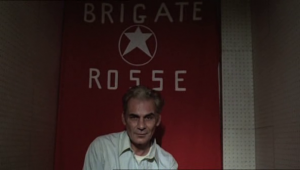The Moro Affair in the Movies of Gian Maria Volonté
My book chapter on “The Moro Affair in the Movies of Gian Maria Volonté” is available in The Moro Affair: Memories and Narrations. Massa: Transeuropa, 2016. Eds. Ugo Perolino and Leonardo Casalino. The book is available here.
I also presented it at the 45th Annual Convention, Northeast Modern Language Association (NEMLA) on April 3-6, 2014. Harrisburg, Pennsylvania; and delivered an invited talk at the Università “G. D’Annunzio” Chieti-Pescara on December 15, 2015.
ABSTRACT: This essay furnishes an original way of thinking about the Moro affair through a consideration of the most representative actor of Italian civil cinema, Gian Maria Volonté. Volonté was the leading character in a series of film by directors Petri, Rosi, Montaldo, Pontecorvo and Ferrara, whose main characteristic lies in reconstructing historical events, mainly political crises and conspiracies. Volonté acquired international fame playing key real-life figures of Italian postwar economy and politics whose beliefs were antithetical to those of his left-wing persona (e.g.; Enrico Mattei). Most notably, he played the President of the Christian Democrats Aldo Moro in Todo Modo (1976) and The Moro Affair (1986). The movies appeared two years before and eight years after Moro’s assassination by the Red Brigades. In this study, I argue that the actor touched his artistic climax by delivering two mimetic but antithetical portrayals of Moro (one caricatured and the other extremely realistic). Thus, I approach the two texts together as a unique text of Volonté’s, in which Moro becomes first distanced and then embraced. Volonté did not simply represent as close as physically possible Moro, who was already represented in television newsreel and newspapers articles, and thus very well known to his audiences. Instead, he replaced him in the collective imaginary, eliminating every trace of familiarity. What does Volonté help us understand about acting, his characters, and the sociopolitical scenario of his time? How did he embody, but also alter, characteristics associated with questions of Moro’s identity, value, and attitude? I answer these questions by evidencing how the climax and decay of Volonté’s stardom is inextricably linked to questions of national imaginary.


Leave a Reply